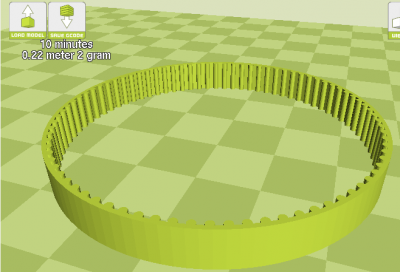3D Printed GT2 Belts
Jump to navigation
Jump to search
Basics
- This page goes over the use of FDM 3D Printers to produce GT2 Belts
- This would allow the Universal Axis to be all OSE made minus the rods and screws
- Need to check the accuracy of the "teeth" being printed, and the strength of the weld if a segment joining method is used
- Perhaps use a smaller diameter nozzle?
Print Methods
Flat Method
- It would be printed flat in a strip or strips and merged together once done
- Has the advantage of being perhaps more accurate/less likely to fail?
Vertical Loop Method
- Printed in one peice in a circular loop
- Has the advantage of not requiring post print welding
- Has the disadvantage of limiting size to the largest circle withing the print bed
Vertical Snake
- Prints a snaking ribbon with the thin edge contacting the print bed
- Hybrid of the flat and vertical methods
- Requires post merging, but maximises printable amount
Conveyor Belt Printer
- With one of these, the belt could be printed near continously and cut + fused when needed
Download
- Belt in OpenSCAD with customizer - https://www.thingiverse.com/thing:1975381
Section Fusing Methods
Hot Plate Welding
- Did some research and this is supposedly the technical industry name for this process
- For OSE Use perhaps a soldering iron on low, and a custom toolhead (flat metal rectangle slightly more wide than the belt?)
Ultrasonic Welding
- More complex
- Advantages may not apply here?
Files
- https://www.thingiverse.com/thing:165792
- Seems to work:
Cost Analysis
At 2 grams/6 inch - or 10 grams per 30" of the D3D Pro 8" bed - This makes 50 g for 5 axes (12.5 feet), or $1.5 belt cost with $30/kg filament. Compare to $5 for 30'. Price is about 1/2 as much for the 3D printed version using COTS filament, and much cheaper once own filament is made.
Internal Links
- GT2 Belts
- Universal Axis
- Mostly 3D Printed
- Reprap
- 3D Printed Belts - clothing.
External Links
- articles on this? [[Category:Belts Gears and Pulleys ? idk
